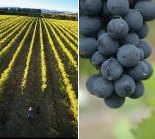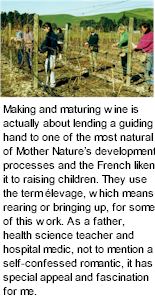


Associate Professor and Consultant Neurologist, Ivan Donaldson, is a wine writer and wine judge. He also oversees viticulture and wine styles. His wife, Christine, is business manager and as a passionate opera lover, organises annual operatic concerts in Pegasus Bay's natural amphitheatre. Their eldest son, Matthew, did an oenology degree and a postgraduate diploma in viticulture at Roseworthy College in Australia. He and his partner Lynnette Hudson, who graduated with distinction from Lincoln University with a postgraduate diploma in oenology and viticulture, are the winemakers.

Matthew Donaldson supervises the reds and Lynnette oversees the whites. Another son, Edward Donaldson, is marketing manager and, as a trained chef, supervises the Pegasus Bay Vineyard restaurant. Pegasus Bay is an entirely family-owned and operated enterprise.
The Waipara Valley is in the south island of New Zealand, 30 minutes drive north of Christchurch. Its latitude equates to that of the south of France in the northern hemisphere. To the east we are separated from Pegasus Bay by a range of hills which protect it from the cooling winds of the pacific. To the west lie the Southern Alps (Main Divide), from whence the region's hot nor'west winds derive. Its sheltered position, but proximity to the sea, give it warm days, cool nights and a dry autumn, resulting in a very prolonged ripening period. This promotes intense flavour development and optimal ripeness, while retaining good natural acidity.
Within the Waipara Valley, Pegasus Bay vineyard gets maximum protection from the Pacific's easterly breezes by being tucked up under the lee of the Teviotdale range. Heat summation during the day is promoted by smooth stones and gravels left behind by an ice age glacier. The soil is freely draining and of low fertility, resulting in naturally reduced vine vigour. This produces low yields of optimally ripened, high quality, flavourful grapes, which fully express the qualities of this unique setting. An unusually large vineyard staff allows operations such as shoot thinning, crop thinning, berry exposure and fruit selection, to be carried out meticulously.

Chardonnay is made by traditional Burgundian methods, fermenting juice in French oak barriques, ageing on lees and allowing malolactic fermentation. The wine has concentrated fruit flavours with butterscotch and savoury overtones. It is full-structured but refined and flavours linger on the palate. In years that allow, a noble barrel fermented chardonnay called Finale is produced. The fruit for this wine is left on the vine to become infected with botrytis. This concentrates the flavours, sugars, and acids, producing a complex, luscious sweet wine with a lively non-cloying balance.
Pinot Noir is handcrafted in the time-honoured Burgundian way, using small vat fermentation of grapes, hand plunging to moisten the cap and gentle separation of the wine before 18 months maturation in French oak barriques in which it undergoes malolactic fermentation. It is clarified naturally by settling before being bottled unfiltered. Pegasus Bay Pinot has gamey hints overlying ripe berry characters. Very low cropping levels result in a rich full bodied wine with the velvety texture which makes this variety so famous. In special years Prima Donna is produced, a tribute to the ultimate quality but somewhat temperamental nature of Pinot Noir. Our aim is to express the feminine qualities of this seductive grape variety.
Meticulous work in the vineyard results in small yields of beautifully ripe fruit which has been fully exposed to the sun. Cabernet Sauvignon, Cabernet Franc and Merlot grapes are fermented separately in small tanks, being splashed and pumped over in the Bordeaux manner. Maturation is for 18th months in small oak casks of which about 30% are new. During this time four to six rackings are given, achieving clarity without filtration. This traditional mix of claret grapes produces an inky, multi-faceted wine with cassis, cigar box and spice characters, a generously fruity palate and a backbone of fine tannins. In the best vintages, selected grapes are vinted into a special version of this wine called Maestro. It is a bold full bodied red which is refined by bottle age before release.
The wine-making philosophy is to grow grapes of the highest quality which fully express the features of the vineyard and to handle these with the utmost respect. Natural methods and as little intervention as possible at all stages from vine to bottle. Sustainable viticultural management, organic techniques, low crop levels, minimal handling of fruit during processing and gentle pressing are standard procedures. Wines go through natural malolactic fermentation and clarify by settling. The red wines are bottled without filtration, to capture the unique flavours of the vineyard, in the Pegasus Hills wines
